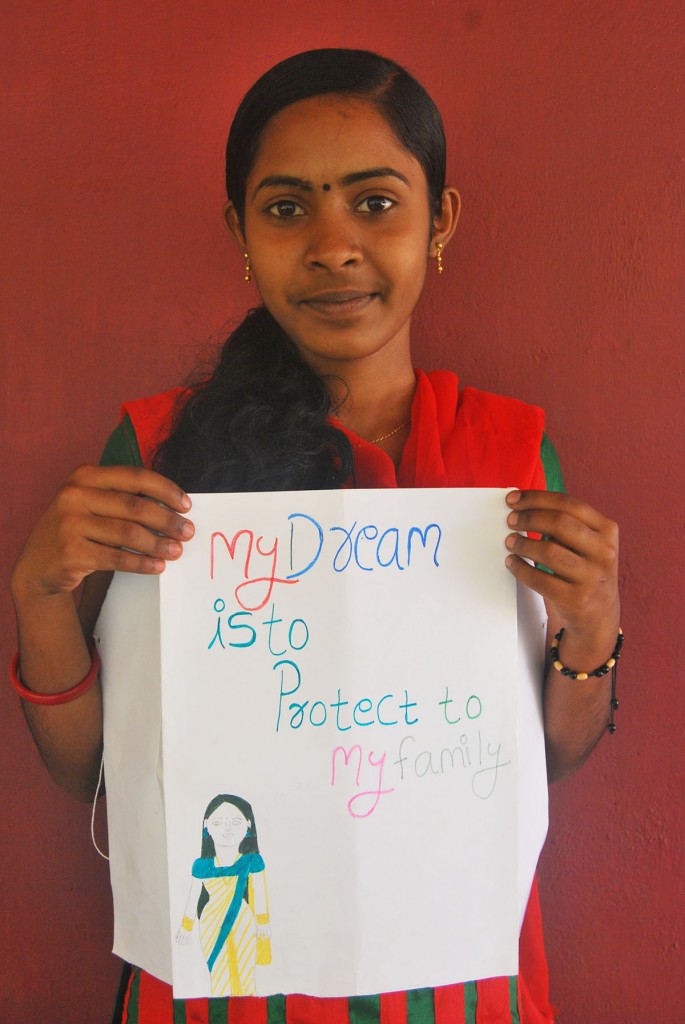Women’s rights activists around the world have found a new poster child, literally, in 2014 Nobel Peace Prize co-recipient Malala Yousafzai. Famous for having been shot by members of the Taliban because of her outspokenness about the importance of education for girls in Pakistan, she continues to petition for equal access to education for all children around the world.

“Education is the most important thing in life. If I am educated, I will know how to behave and I will be able to answer any question.”
Drisya, age 15
I heard the announcement about Malala’s Nobel Peace Prize win just after returning to the village of Prasanthagiri to begin the second part of my time as a Profugo Field Fellow. That day, while walking down the road to the nearby market stalls on our tiny nearby town’s “main street,” I stopped to greet two of my favorite kids in the area – twin teenagers, daughters of local vegetable vendor Yusef Chetin. These girls stuck out to us Field Fellows because although they were not among those children who participated in Profugo programs (since they lived over in the town, not in our village), we knew them fairly well because both their English skills and confidence were noteworthy, particularly amongst the girls we knew. They were smart, they were sharp, and they were very proud of their academic achievements, and they were not afraid to show it. A conversation with them always included discussions about a recent mathematics test (which they always passed with flying colors), or their newly acquired Arabic vocabulary, which they taught us with pride.
It occurred to me that day that these girls, champions of education simply by being proud of their academic achievements, were our area’s representatives of all that Malala continues to fight for. These girls are the lucky ones in the developing world in general, but in our local area as well – the ones with a father that seemed as supportive as Yousafzai’s that encourage the twins to continue to pursue their education at an age when other parents might be urging their daughters to prioritize household chores over schoolwork.
Although the girls in the area we serve are free from the oppressive presence of extremists like the ones Malala and her classmates faced, they are not free of obstacles that challenge their right to equal education. That’s why these twins’ confidence, as well as their father’s support of their achievements, was like a breath of fresh air for me whenever I saw them in town. Unfortunately, confidence was not something we frequently witnessed amongst the older girls and young women in the very rural and traditional community, nor was active or vocal paternal support of children. We female Field Fellows regularly answered a number of questions from our students and young neighbors, incredulous about the fact that we had gone to college and were going back for our graduate degrees, and that we were to choose our husbands and delayed having children until what they considered an old age to enter into motherhood.
The girls in the village knew that they faced obstacles. Domestic abuse of wives is altogether too common, especially in rural India, especially as alcohol floods its way into even the most poor or remote households. But our girls know their best way out of the rough lives that too many have witnessed their mothers and grandmothers live: education. Likitha, a 13-year-old girl from the village we serve, recognizes that education opens doors for young women, who have just started to leave their homes to pursue education and careers in recent decades in India. “Before [women] were often not allowed to go out to work. Now we are allowed much more education. Now we are getting the strength and energy to go out wherever the work is. Like that, education gives us opportunities.”
Likitha recognizes that many girls from lower-income and marginalized communities are still unable to go to school, required rather to be at home to help their overworked mothers do chores or take care of younger siblings. “But it is important to give girls education,” she maintains.
Malala Yousafzai’s words reached ears around the world faster than she could ever know. Within a day of the announcement, my students had all heard the news, having seen the newspaper article, and talked about it at school. As Likitha said, “I have respect for Malala because she works for girls’ education, like a social worker, because girls are not getting education… Girls want education, but the people are not giving [them one].”
As I continue to hear news about Malala’s various campaigns for equal education for all children, I continue to be reminded of our little advocates for education in Prasanthagiri, including our local vegetable vendor’s daughters. No, our girls do not face nearly all of the threats that Malala did on a daily basis when she lived in an area occupied by extremists. But our girls, in a rural enough area to promote conservativism of thought and behavior, do face very real threats to education, threats that they fight every morning when they grab their backpacks and head off to school – especially when they do so confidently.

Leave a Reply
You must be logged in to post a comment.